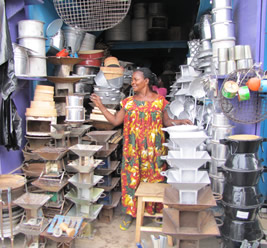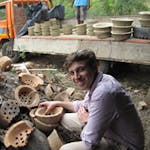From the conference rooms of Abuja to the communities in and around Accra, I consistently heard the phrase ‘you are welcome’ during my recent trip to Nigeria and Ghana. I thought it was just a formal acknowledgment to my ‘thank you’, but as I later heard Radha Muthiah, Executive Director, Global Alliance for Clean Cookstoves, explain, West Africans are often known not just for their statements of welcome, but for their actions of welcome as well. Indeed, we were welcomed to both countries with kindness, hospitality, and collegiality.
 In Abuja, Radha and I had the pleasure of participating in the launch of the Nigerian Alliance for Clean Cookstoves, an affiliate of the Global Alliance for Clean Cookstoves with a goal of 10 million households adopting clean cooking solutions by 2020. That’s 10 percent of the Global Alliance’s 100 by ‘20 goal! With more than 92 million Nigerians reliant on solid fuels for cooking their daily meal, they have their work cut out for them. However, just as we at the Global Alliance like to say, it’s an ambitious but achievable goal.
In Abuja, Radha and I had the pleasure of participating in the launch of the Nigerian Alliance for Clean Cookstoves, an affiliate of the Global Alliance for Clean Cookstoves with a goal of 10 million households adopting clean cooking solutions by 2020. That’s 10 percent of the Global Alliance’s 100 by ‘20 goal! With more than 92 million Nigerians reliant on solid fuels for cooking their daily meal, they have their work cut out for them. However, just as we at the Global Alliance like to say, it’s an ambitious but achievable goal.
With about one dozen public, private and nongovernmental partners, the Nigerian Alliance is looking to strengthen its membership in order to scale up and address and arrest this silent killer that is prevalent in the homes of 67 percent of the population – claiming the lives of 95,000 Nigerians annually. Radha believes the Global Alliance will be able to support their efforts in a few strategic ways, such as government advocacy to reduce tariffs and non-financial trade barriers, capacity building through the creation of a testing center, and introducing the Nigerian Alliance to potential new partners and donors.
As an added bonus to our time in Abuja, I even had the chance to catch up with our old UN Foundation colleague, Innocent Onah, who is now working for a Nigerian senator in the capital!
Ghana was an opportunity to meet with our Ghanaian partners and the broader stakeholders within that country’s cookstove sector, as well as visit the factories and facilities of some of our implementing partners who are building improved cookstoves. Radha and I caught up with our colleague Amy Sticklor for these activities, who was also checking up on the progress of our Ghanaian market assessment currently being conducted by Accenture Development Partnerships. The market assessment will help the Global Alliance paint a broad picture of the country’s cookstove sector, and subsequently prioritize which activities and interventions will have the most benefit to the people of Ghana and our 100 by ’20 goal.
The Ghanaian cookstove market is dominated by the gyapa (“good fire”) stove, which looks like two cones sitting on top of one another. In fact, gyapa has become a word in the Ghanaian vernacular similar to the way we use ‘Kleenex’ or ‘Band-Aid’ in the United States – it is formally a branded stove but became so popular that the word transcended the one company that started making them. Our team had the chance to visit multiple steps in the production process, from scrap metal collection to cementing to firing.
What we learned in Ghana was that though the gyapa stoves have made significant progress in reducing the amount of fuel the users consume, thereby saving them money, they currently are not making enough progress in benefiting the user’s health. So they are improved, but not necessarily clean, largely because the fuel that powers the gyapa is charcoal – a fuel approximately 35 percent of the population is reliant upon. Through the robust value chains they are tapped into, the relationships they have with their end users, and their commitments to the Global Alliance’s goal for adoption of clean cooking technologies, our Ghanaian partners are committed to taking their customers up the fuel ladder toward more efficient and cleaner stoves and fuel sources.
I’d like to thank Ewah Otu Eleri, Suraj Wahab, and MacKenzie Dove and their teams at ICEED, Toyola, and Relief International, respectively, for helping ensure that the Global Alliance for Clean Cookstoves was welcomed in West Africa. We look forward to returning shortly!



 View All Blog Posts
View All Blog Posts